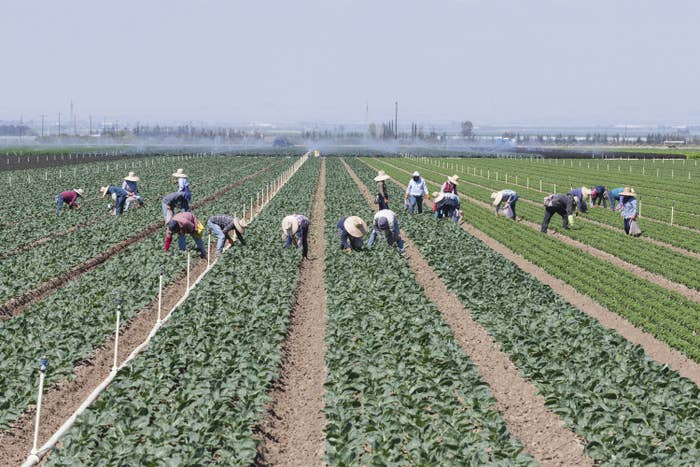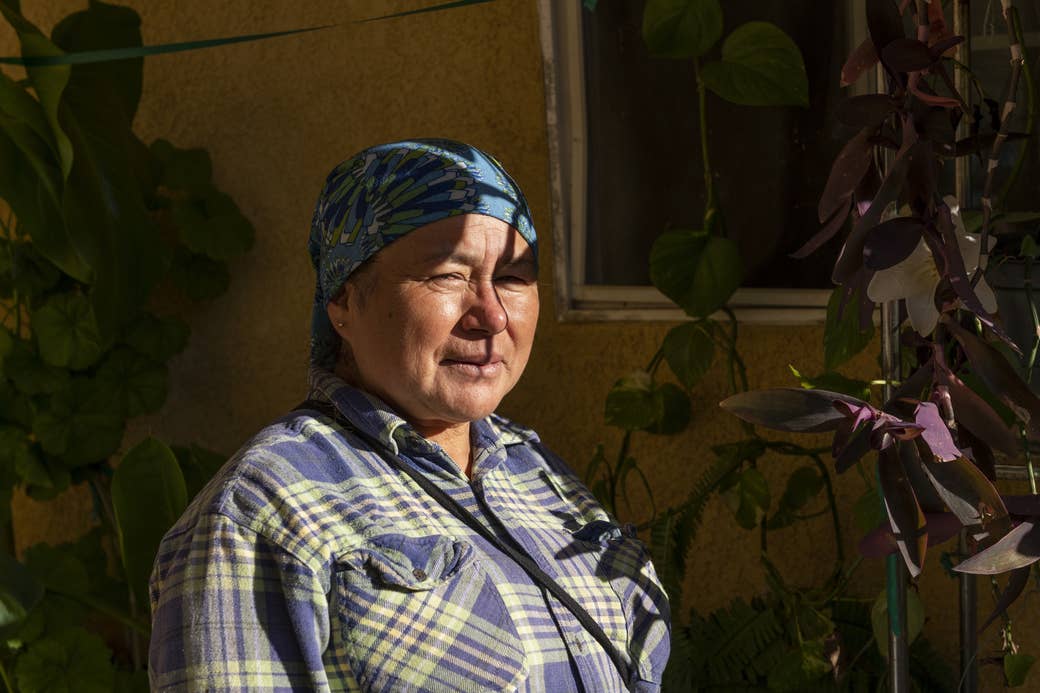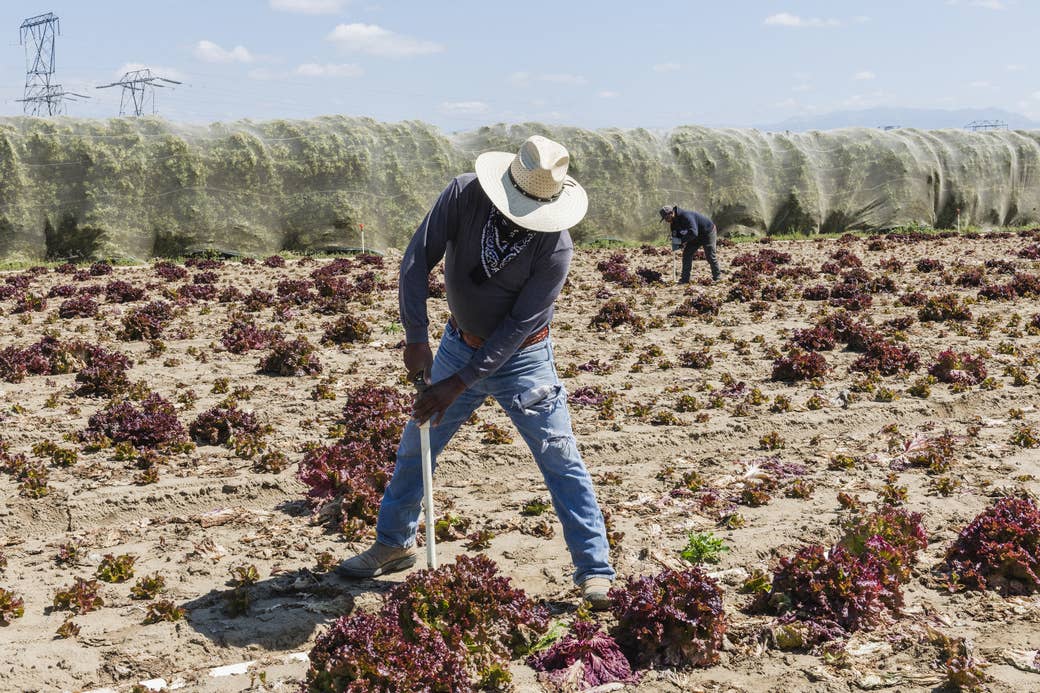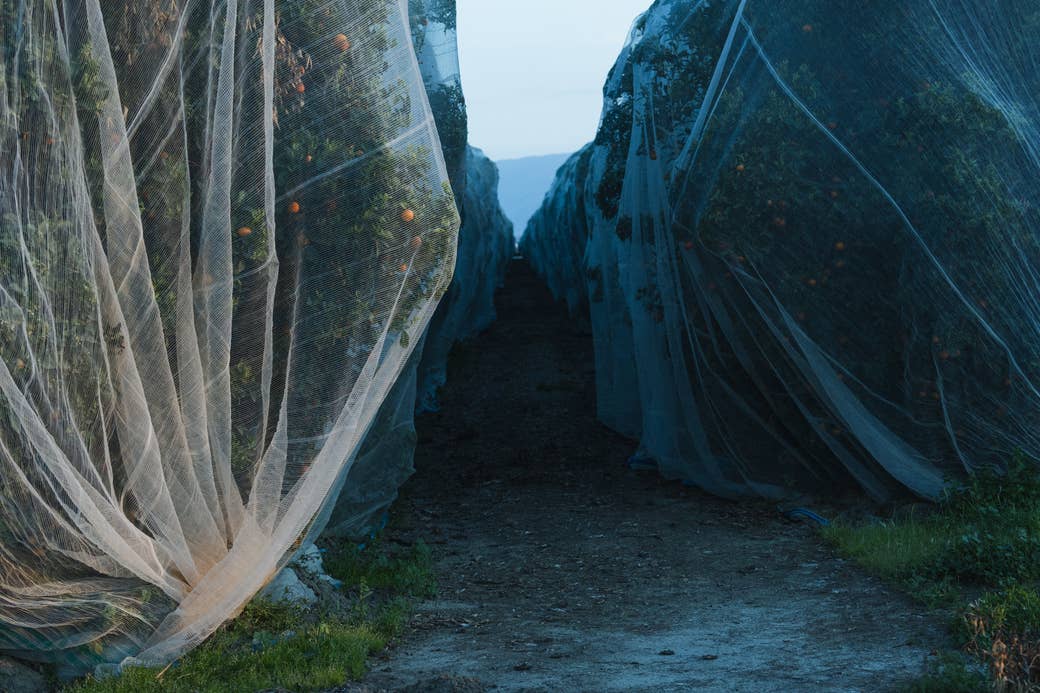FARM WORKERS ARE NOT PROTECTED WHILE WORKING IN YOUR FIELDS
“I’m scared of getting sick. I don’t have any type of health insurance, anything to help me.”
Adolfo FloresBuzzFeed News Reporter
Hamed AleazizBuzzFeed News Reporter
Posted on April 6, 2020

Andrew Cullen for BuzzFeed News
As many in the US stayed at home to protect themselves from the global coronavirus pandemic, Teresa Mendoza, a 58-year-old undocumented farmworker from Mexico, spent six days a week picking green onions in Kern County, California, cleaning them, and tying them into bunches, just a few feet away from others like her.
Faced with the possibility of having to spend weeks in quarantine, people across the US have rushed to grocery stores to panic-buy food and supplies to tide them over while hunkered down.
Yet the agriculture and food processing plants, like meatpacking facilities, have been deemed essential by the federal government amid the pandemic, creating working conditions that most people in the US have been told to avoid. And it’s only going to get worse as thousands of migrant workers are expected to return to the US as the summer harvest picks up.
Meanwhile, for employees at food processing plants, some of which have already had cases of COVID-19, the disease caused by the coronavirus, social distancing is virtually impossible. And farmworkers with few safety nets should they fall ill say they are toiling in fields with no information on how to protect themselves.
“We are very worried,” Mendoza, who lives in Kern County and has worked in the agricultural industry for 15 years, told BuzzFeed News. “I’m scared of getting sick. I don’t have any type of health insurance, anything to help me.”
In recent days, Mendoza switched jobs and began weeding in the blueberry fields, a more lucrative job that also allowed her more space from other workers. Still, she’s afraid: “I don’t know if someone will come to work who is sick — I just don’t know.”
BuzzFeed News spoke with multiple fieldworkers who agreed to only use their first names because of their undocumented status.
There are an estimated 2.4 million farmworkers in the US, and about half are undocumented. One of the precautions health officials have instructed people take against the coronavirus, social distancing, is difficult for them. In addition to working close to one another, they often travel to work sites in packed buses or other shared vehicles, advocates said.
Over a third of the US’s vegetables and two-thirds of the country's fruits and nuts are grown in California, according to 2018 figures from the California Department of Food and Agriculture. Mendoza said she’s continuing to work because she needs the income to survive. She also realized that her work helps a supply chain struggling to feed a country during a pandemic.
“I feel proud,” said Mendoza, who makes just over $500 a week. “I know that we are doing important work that is feeding the rest of the country. There are a lot of workers in the field. We are essential workers that this country needs.”

Andrew Cullen for BuzzFeed News
Teresa Mendoza, a vegetable picker in California's Central Valley.
Teresa Romero, president of the United Farm Workers union, has been calling on agriculture employers to extend sick leave and provide easy access to health services, since many workers are undocumented and live in rural areas.
“Some of us are blessed with the opportunity to work from home and maintain social distance to protect ourselves. Unfortunately not everyone is that lucky,” Romero said on a call with reporters. “Unfortunately, farmworkers are uniquely vulnerable in the pandemic because they work in cramped, substandard, and unsanitary conditions.”
If farmworkers are deemed essential because they help get food to the public, Romero said, then it’s important to extend protections for them because it not only affects them and their families, but the food supply.
“Farmworkers have been deemed essential workers, and they’re right — they’re the people that produce all of the food in the country,” Romero said.
The United Farm Workers union (UFW) is also asking employers to eliminate the 90-day waiting period for new workers to be eligible for sick pay, stop requiring doctors’ notes when farmworkers claim sick days, clean and disinfect frequently touched surfaces multiple times a day, and arrange for daycare assistance since schools are closed.
“Many farmworkers are single mothers,” Romero said. “They have to continue working to provide for their families, so they’re being forced to leave children at home … because they don’t have family support.”
Jim Cochran, owner of Swanton Berry Farm, an organic strawberry operation and a UFW-represented grower outside of Santa Cruz, California, said his farm is fortunate enough to provide housing for the 25 year-round employees in an isolated area, which could help decrease the chances of someone contracting the coronavirus.
Even before President Trump signed a sick pay bill, Cochran told his employees that if they got sick and needed to stay home for a few weeks, he would cover their wages.
"I couldn't afford to do it, but I offered to do it anyway," Cochran said. "It's a constant balancing act and that's what makes it interesting, because you have the human needs of your employees and the market needs and every day something is changing."

Andrew Cullen for BuzzFeed News
Farmworkers install irrigation pipes in a lettuce field in California's Central Valley during the 2020 COVID-19 outbreak.
Leticia, a 31-year-old mother of four in Bakersfield, California, normally works as a mandarin orange picker in the winter and picks blueberries in the summer. In recent days, however, she stopped working because of fears she would bring home the virus and potentially expose her 3-year-old boy, who has asthma.
Leticia, who is undocumented, said that the decision costs her family upward of $600 a week, but it was the safer choice. The family has had to cut down on expenses and rely solely on her husband, who works as a forklift driver.
“I’m really worried. I was afraid something might happen to my son,” Leticia said. “It’s been very difficult.”
Paula Schelling, acting chairperson for the National Joint Council of Food Inspection Locals for the American Federation of Government Employees, said her 6,500 members want to continue to do their jobs, but they're not being given any protective gear against COVID-19 by the USDA Food Safety and Inspection Service.
"The one thing the agency keeps saying is follow the CDC guidelines, follow the CDC guidelines," Schelling told BuzzFeed News. "But social distancing is virtually impossible."
A food safety inspector has already died of COVID-19 in New York City, Schelling said. Four additional inspectors have since tested positive for COVID-19 at other sites.
"Ultimately, there's people out there ensuring the food is being processed safely and they need to be protected," Schelling said.
At least eight employees at a date packinghouse in Coachella, California, tested positive for COVID-19, said Lee Ellis, accounting manager at SunDate. After conducting a deep cleaning, which the company does every day, Ellis said, the packinghouse reopened.
Salvador, an undocumented 31-year-old mandarin picker also in Bakersfield, said work has picked up in recent weeks, forcing him to show up each day in the orchards. While he is separated from others while picking citrus, the drives to work are crammed with up to seven workers in a van.
“If I don’t work, my family does not eat,” said Salvador, who has four young children at home. “If the farmworkers don’t work, then the fruits and vegetables don’t arrive.”

Andrew Cullen for BuzzFeed News
Mandarin trees in California's Central Valley are shrouded in netting that keeps bees from pollinating their blooms, resulting in seedless fruit.
Earlier this month, Salvador’s children have asked him why he’s going to work if others are being told to stay home. Among his biggest worries is what his family would do if they get sick from coronavirus.
“What would happen to our expenses? How would we deal with bills? We don’t have family,” said Salvador.
While the agriculture industry is expected to receive $23.5 billion in aid as part of the $2 trillion coronavirus stimulus package, half of farmworkers won't qualify for federal stimulus benefits because they're undocumented.
The New American Economy, an immigration think tank, estimated that in 2018, undocumented immigrants contributed $20.1 billion in federal taxes and $11.8 billion in state and local taxes.
On Wednesday, Trump was asked how undocumented immigrants, millions of whom pay taxes using an Individual Taxpayer Identification Number, will survive the economic slump caused by COVID-19.
“We have a lot of citizens right now that won't be working, so what are you going to do?” he told reporters. “It’s a tough thing, it’s a very terrible, it’s a very sad question. I must be honest with you, but they came in illegally.” ●

MORE ON IMMIGRATION
Trump Ordered All Immigrants Caught Entering The US Illegally To Be Turned Back To Ward Off Coronavirus SpreadAdolfo Flores · March 20, 2020
The Trump Administration Is Now Deporting Unaccompanied Immigrant Kids Due To The CoronavirusHamed Aleaziz · March 30, 2020
Three Unaccompanied Immigrant Children In US Custody Have Tested Positive For The CoronavirusHamed Aleaziz · March 26, 2020

Adolfo Flores is a reporter for BuzzFeed News and is based in McAllen, Texas..

Hamed Aleaziz is a reporter for BuzzFeed News and is based in San Francisco.
SEE
https://plawiuk.blogspot.com/search?q=SMITHFIELD
https://plawiuk.blogspot.com/search?q=TYSON
https://plawiuk.blogspot.com/search?q=MEAT+PACKING
https://plawiuk.blogspot.com/search?q=JBS
https://plawiuk.blogspot.com/search?q=UFW


No comments:
Post a Comment